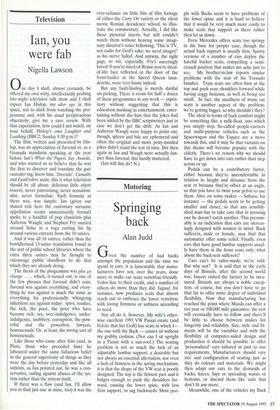Television
Ian, you were fab
Nigella Lawson
ne day I shall, almost certainly, be offered my own witty, intellectually probing late-night television talk show and I shall expect Ian Hislop, my alter ego in this space, not to shirk from watching the pro- gramme and, with his usual perspicacious objectivity, give me a rave review. With that expectation, how could I not watch, on your behalf, Hislop's own Laughter and Loathing (BBC2, Sunday 9.30 p.m.)?
The film, written and presented by His- lop, was an appreciation of Juvenal or, as a Granada mandarin speaking at the year before last's What the Papers Say Awards, and who wanted us to believe that he was the first to discover and translate the quis custodiet tag, knew him, 'Juvenile'. Casualty and EastEnders aside, this is what television should be all about: delicious little objets trouves, never patronising, never sensation- alist, never formulaic. Such formula as there was, was simple: Ian (given our shared role here the customary surname appellation seems unnecessarily formal) spoke to a handful of pop classicists plus Auberon Waugh; and Stephen Fry snarled around Soho in a toga curling his lip around various extracts from the 16 satires.
And it was all 16 satires, rather than the bowldlerised 13-satire translation found in the sort of public school libraries where the extra three satires may be thought to encourage public shoolboys to do that which they are already doing.
The thesis of the programme was plus cc, change . . . , which, it turned out, is one of the few phrases that Juvenal didn't coin.
Juvenal was against everything, and every- thing he was against is much the same as everything his professionally whingeing inheritors are against today: spivs, toadies, the rich, the poor, the poor who have become rich, sex, over-indulgence, under- indulgence, snobbery, corruption, the pow- erful and the powerless, lawyers, homosexuals. Or, at least, the wrong sort of homosexuals.
Like those who came after him (and, in Plato, those who preceded him) he laboured under the same fallacious belief in the general superiority of things as they were the day before yesterday and like all satirists, as Ian pointed out, he was a con- servative, railing against abuses of the sys- tern rather than the system itself.
If there was a flaw (and Ian, I'll allow you to find just one in mine, too) it was the over-reliance on little bits of film footage of either the Carry On variety or the silent movie Roman decadence school, to illus- trate the commentary. Actually, I did like these pictorial inserts but still couldn't watch them without hearing some imagi- nary director's voice bellowing, 'This is TV, not radio for God's sake: we need images!' as his nerve failed. And anyway, the sight gags, to• wit, especially, Fry's sneeringly bored if-you're-tired-of-Rome-you're-tired- of-life face reflected in the door of the front-loader at the Speed Queen laun- derette, were very funny indeed.
But any fault-finding is merely dutiful nit-picking. There is room for half a dozen of these programmes in any week — expos- itory without suggesting that this is education masking as entertainment; enter- taining without the hint that the jokes had been added by the BBC scriptwriters just in case we don't get the drift. As Ian and Auberon Waugh were happy to point out, though, spleen and bile are ephemeral and often the original and more petty-minded jokes didn't stand the test of time. But then again as Ian and Waugh were actually fun- nier than Juvenal, this hardly mattered.
(Ian will this do? N.)


















































 Previous page
Previous page